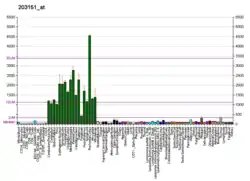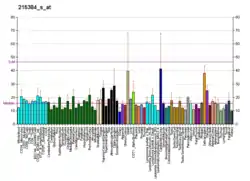MAP1A
Microtubule-associated protein 1A is a protein that in humans is encoded by the MAP1A gene.[5][6][7]
Function
This gene encodes a protein that belongs to the microtubule-associated protein family. The proteins of this family are thought to be involved in microtubule assembly, which is an essential step in neurogenesis. The product of this gene is a precursor polypeptide that presumably undergoes proteolytic processing to generate the final MAP1A heavy chain and LC2 light chain. Expression of this gene is almost exclusively in the brain. Studies of the rat microtubule-associated protein 1A gene suggested a role in early events of spinal cord development.[7]
References
- GRCh38: Ensembl release 89: ENSG00000166963 - Ensembl, May 2017
- GRCm38: Ensembl release 89: ENSMUSG00000027254 - Ensembl, May 2017
- "Human PubMed Reference:". National Center for Biotechnology Information, U.S. National Library of Medicine.
- "Mouse PubMed Reference:". National Center for Biotechnology Information, U.S. National Library of Medicine.
- Lien LL, Feener CA, Fischbach N, Kunkel LM (July 1994). "Cloning of human microtubule-associated protein 1B and the identification of a related gene on chromosome 15". Genomics. 22 (2): 273–80. doi:10.1006/geno.1994.1384. PMID 7806212.
- Fukuyama R, Rapoport SI (Sep 1995). "Brain-specific expression of human microtubule-associated protein 1A (MAP1A) gene and its assignment to human chromosome 15" (PDF). J. Neurosci. Res. 40 (6): 820–5. doi:10.1002/jnr.490400613. PMID 7629894.
- "Entrez Gene: MAP1A microtubule-associated protein 1A".
- Morris JA, Kandpal G, Ma L, Austin CP (Jul 2003). "DISC1 (Disrupted-In-Schizophrenia 1) is a centrosome-associated protein that interacts with MAP1A, MIPT3, ATF4/5 and NUDEL: regulation and loss of interaction with mutation". Hum. Mol. Genet. 12 (13): 1591–608. doi:10.1093/hmg/ddg162. PMID 12812986.
Further reading
- Snásel J, Pichová I (1996). "The cleavage of host cell proteins by HIV-1 protease". Folia Biol. (Praha). 42 (5): 227–30. doi:10.1007/BF02818986. PMID 8997639.
- Wallin M, Deinum J, Goobar L, Danielson UH (1990). "Proteolytic cleavage of microtubule-associated proteins by retroviral proteinases". J. Gen. Virol. 71 (9): 1985–91. doi:10.1099/0022-1317-71-9-1985. PMID 2212989.
- Schoenfeld TA, McKerracher L, Obar R, Vallee RB (1989). "MAP 1A and MAP 1B are structurally related microtubule associated proteins with distinct developmental patterns in the CNS". J. Neurosci. 9 (5): 1712–30. doi:10.1523/JNEUROSCI.09-05-01712.1989. PMID 2470876.
- Bloom GS, Luca FC, Vallee RB (1984). "Widespread cellular distribution of MAP-1A (microtubule-associated protein 1A) in the mitotic spindle and on interphase microtubules". J. Cell Biol. 98 (1): 331–40. doi:10.1083/jcb.98.1.331. PMC 2113021. PMID 6142895.
- Pedrotti B, Colombo R, Islam K (1994). "Microtubule associated protein MAP1A is an actin-binding and crosslinking protein". Cell Motil. Cytoskeleton. 29 (2): 110–6. doi:10.1002/cm.970290203. PMID 7820861.
- Fujii T, Watanabe M, Ogoma Y, Kondo Y, Arai T (1993). "Microtubule-associated proteins, MAP 1A and MAP 1B, interact with F-actin in vitro". J. Biochem. 114 (6): 827–9. PMID 7908020.
- Mann SS, Hammarback JA (1994). "Molecular characterization of light chain 3. A microtubule binding subunit of MAP1A and MAP1B". J. Biol. Chem. 269 (15): 11492–7. PMID 7908909.
- Fink JK, Jones SM, Esposito C, Wilkowski J (1996). "Human microtubule-associated protein 1a (MAP1A) gene: genomic organization, cDNA sequence, and developmental- and tissue-specific expression". Genomics. 35 (3): 577–85. doi:10.1006/geno.1996.0400. PMID 8812494.
- Vaillant AR, Müller R, Langkopf A, Brown DL (1998). "Characterization of the microtubule-binding domain of microtubule-associated protein 1A and its effects on microtubule dynamics". J. Biol. Chem. 273 (22): 13973–81. doi:10.1074/jbc.273.22.13973. PMID 9593747.
- Brenman JE, Topinka JR, Cooper EC, McGee AW, Rosen J, Milroy T, Ralston HJ, Bredt DS (1998). "Localization of postsynaptic density-93 to dendritic microtubules and interaction with microtubule-associated protein 1A". J. Neurosci. 18 (21): 8805–13. doi:10.1523/JNEUROSCI.18-21-08805.1998. PMID 9786987.
- Hirst J, Lui WW, Bright NA, Totty N, Seaman MN, Robinson MS (2000). "A family of proteins with gamma-adaptin and VHS domains that facilitate trafficking between the trans-Golgi network and the vacuole/lysosome". J. Cell Biol. 149 (1): 67–80. doi:10.1083/jcb.149.1.67. PMC 2175106. PMID 10747088.
- Mei X, Sweatt AJ, Hammarback JA (2000). "Regulation of microtubule-associated protein 1B (MAP1B) subunit composition". J. Neurosci. Res. 62 (1): 56–64. doi:10.1002/1097-4547(20001001)62:1<56::AID-JNR6>3.0.CO;2-#. PMID 11002287.
- Ulfig N, Feldhaus C, Setzer M, Bohl J (2000). "Expression of MAP1a and MAP1b in the ganglionic eminence and the internal capsule of the human fetal brain". Neurosci. Res. 38 (4): 397–405. doi:10.1016/S0168-0102(00)00189-9. PMID 11164566.
- Bonnet C, Boucher D, Lazereg S, Pedrotti B, Islam K, Denoulet P, Larcher JC (2001). "Differential binding regulation of microtubule-associated proteins MAP1A, MAP1B, and MAP2 by tubulin polyglutamylation". J. Biol. Chem. 276 (16): 12839–48. doi:10.1074/jbc.M011380200. PMID 11278895.
- Orzech E, Livshits L, Leyt J, Okhrimenko H, Reich V, Cohen S, Weiss A, Melamed-Book N, Lebendiker M, Altschuler Y, Aroeti B (2001). "Interactions between adaptor protein-1 of the clathrin coat and microtubules via type 1a microtubule-associated proteins". J. Biol. Chem. 276 (33): 31340–8. doi:10.1074/jbc.M101054200. PMID 11418592.
- Noiges R, Eichinger R, Kutschera W, Fischer I, Nemeth Z, Wiche G, Propst F (2002). "Microtubule-associated protein 1A (MAP1A) and MAP1B: light chains determine distinct functional properties". J. Neurosci. 22 (6): 2106–14. doi:10.1523/JNEUROSCI.22-06-02106.2002. PMC 6758271. PMID 11896150.
- Ikeda A, Zheng QY, Zuberi AR, Johnson KR, Naggert JK, Nishina PM (2002). "Microtubule-associated protein 1A is a modifier of tubby hearing (moth1)". Nat. Genet. 30 (4): 401–5. doi:10.1038/ng838. PMC 2862212. PMID 11925566.
This article is issued from Wikipedia. The text is licensed under Creative Commons - Attribution - Sharealike. Additional terms may apply for the media files.





